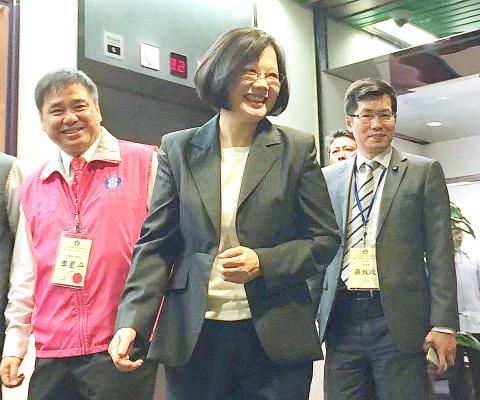Presidential Office spokesman Charles Chen (陳以信) on Friday confirmed that the nation had received an invitation from the WHO to send officials to its annual World Health Assembly (WHA), which is to be held in Geneva later this month, adding that it would be passed on to the new government under president-elect Tsai Ing-wen (蔡英文).
For the past seven years, the WHO has sent an invitation to Taiwan to attend the WHA as an observer under the name “Chinese Taipei.”
What is different this time is that the invitation mentioned UN Resolution No. 2758 and the “one China” principle, which is understood to mean that there is only “one China,” with Beijing interpreting that as the People’s Republic of China (PRC) encompassing Taiwan.

Photo: CNA
The resolution was passed on Oct. 25, 1971, and recognized the PRC as “the only legitimate representative of China to the UN,” expelling the representatives of the Republic of China (ROC).
This year’s meeting is to be held in Geneva from May 23 to May 28, shortly after the inauguration of Tsai on May 20.
Chen said President Ma Ying-jeou (馬英九) viewed the invitation in a positive light, believing it to be an extension of the so-called “1992 consensus,” which refers to a tacit understanding between the Chinese Nationalist Party (KMT) and the Chinese government that both sides of the Taiwan Strait acknowledge there is “one China,” with each side having its own interpretation of what “China” means.
Tsai and her Democratic Progressive Party (DPP) have never recognized the existence of such a consensus.
This year’s WHO invitation, for the first time doing so under the premise of the “one China” principle, is widely seen as the first challenge directed at Tsai.
The incoming administration has to decide by tomorrow, the last day of online registration for the WHA, if it wants to attend the conference.
On Friday, China’s Taiwan Affairs Office (TAO) spokesman Ma Xiaoguang (馬曉光) stressed China’s “clear and consistent” stance on Taiwan’s participation in the international community, which he said was that “reasonable arrangement will be made through cross-strait consultation under the ‘one China’ principle.”
Taiwan has been able to attend the WHA conference since 2009 as an observer in a “special arrangement” under the political basis of the “1992 consensus,” he said.
He added that as Taiwan has expressed a desire to attend the conference several times this year, China heeded the wish and made the arrangement in goodwill.
He said that if the “political basis” is to be destroyed, it would be hard to continue such an arrangement.
China has consistently obstructed Taiwan’s efforts to take part in international organizations, but lifted its objection to Taiwan’s bid to become a WHO observer less than a year after Ma Ying-jeou began his first presidential term in May 2008.

MAKING WAVES: China’s maritime militia could become a nontraditional threat in war, clogging up shipping lanes to prevent US or Japanese intervention, a report said About 1,900 Chinese ships flying flags of convenience and fishing vessels that participated in China’s military exercises around Taiwan last month and in January last year have been listed for monitoring, Coast Guard Administration (CGA) Deputy Director-General Hsieh Ching-chin (謝慶欽) said yesterday. Following amendments to the Commercial Port Act (商港法) and the Law of Ships (船舶法) last month, the CGA can designate possible berthing areas or deny ports of call for vessels suspected of loitering around areas where undersea cables can be accessed, Oceans Affairs Council Minister Kuan Bi-ling (管碧玲) said. The list of suspected ships, originally 300, had risen to about

DAREDEVIL: Honnold said it had always been a dream of his to climb Taipei 101, while a Netflix producer said the skyscraper was ‘a real icon of this country’ US climber Alex Honnold yesterday took on Taiwan’s tallest building, becoming the first person to scale Taipei 101 without a rope, harness or safety net. Hundreds of spectators gathered at the base of the 101-story skyscraper to watch Honnold, 40, embark on his daredevil feat, which was also broadcast live on Netflix. Dressed in a red T-shirt and yellow custom-made climbing shoes, Honnold swiftly moved up the southeast face of the glass and steel building. At one point, he stepped onto a platform midway up to wave down at fans and onlookers who were taking photos. People watching from inside

Japan’s strategic alliance with the US would collapse if Tokyo were to turn away from a conflict in Taiwan, Japanese Prime Minister Sanae Takaichi said yesterday, but distanced herself from previous comments that suggested a possible military response in such an event. Takaichi expressed her latest views on a nationally broadcast TV program late on Monday, where an opposition party leader criticized her for igniting tensions with China with the earlier remarks. Ties between Japan and China have sunk to the worst level in years after Takaichi said in November that a hypothetical Chinese attack on Taiwan could bring about a Japanese

The WHO ignored early COVID-19 warnings from Taiwan, US Deputy Secretary of Health and Human Services Jim O’Neill said on Friday, as part of justification for Washington withdrawing from the global health body. US Secretary of State Marco Rubio on Thursday said that the US was pulling out of the UN agency, as it failed to fulfill its responsibilities during the COVID-19 pandemic. The WHO “ignored early COVID warnings from Taiwan in 2019 by pretending Taiwan did not exist, O’Neill wrote on X on Friday, Taiwan time. “It ignored rigorous science and promoted lockdowns.” The US will “continue international coordination on infectious